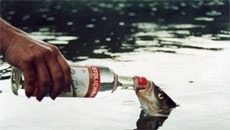People with algae virus in their throats had more difficulty completing a mental exercise than healthy people, and more research is needed to understand why, US scientists say.
The Acanthocystis Turfacea Chlorella Virus 1 (ATCV-1), also seemed to limit the cognitive abilities of mice, who had a harder time navigating a maze and noticing new objects in their surroundings after they were infected.
Previously thought to only infect algae, the algae virus was present in about half of 92 human subjects whose throat swabs were taken by US scientists.
It remains unclear if the virus was truly driving the drop in mental functioning.
Scientists at the John Hopkins Medical School and the University of Nebraska found the virus by accident while they were analysing microbes in the throats of healthy humans for a different study.
Chloroviruses are worldwide. They're very common among inland bodies of fresh water such as lakes and ponds," said lead researcher James Van Etten from the Nebraska Center for Virology, who helped discover their existence in green algae more than 30 years ago.
"But I don't know of many examples of viruses jumping from one kingdom to another. If this turns out to be true, this is quite rare and a total surprise".
Scientists have known for long that viruses interact with human DNA, but further studies are needed to shed more light on the role of the virus on cognition.
The study appeared in the journal Proceedings of the National Academy of Sciences.






